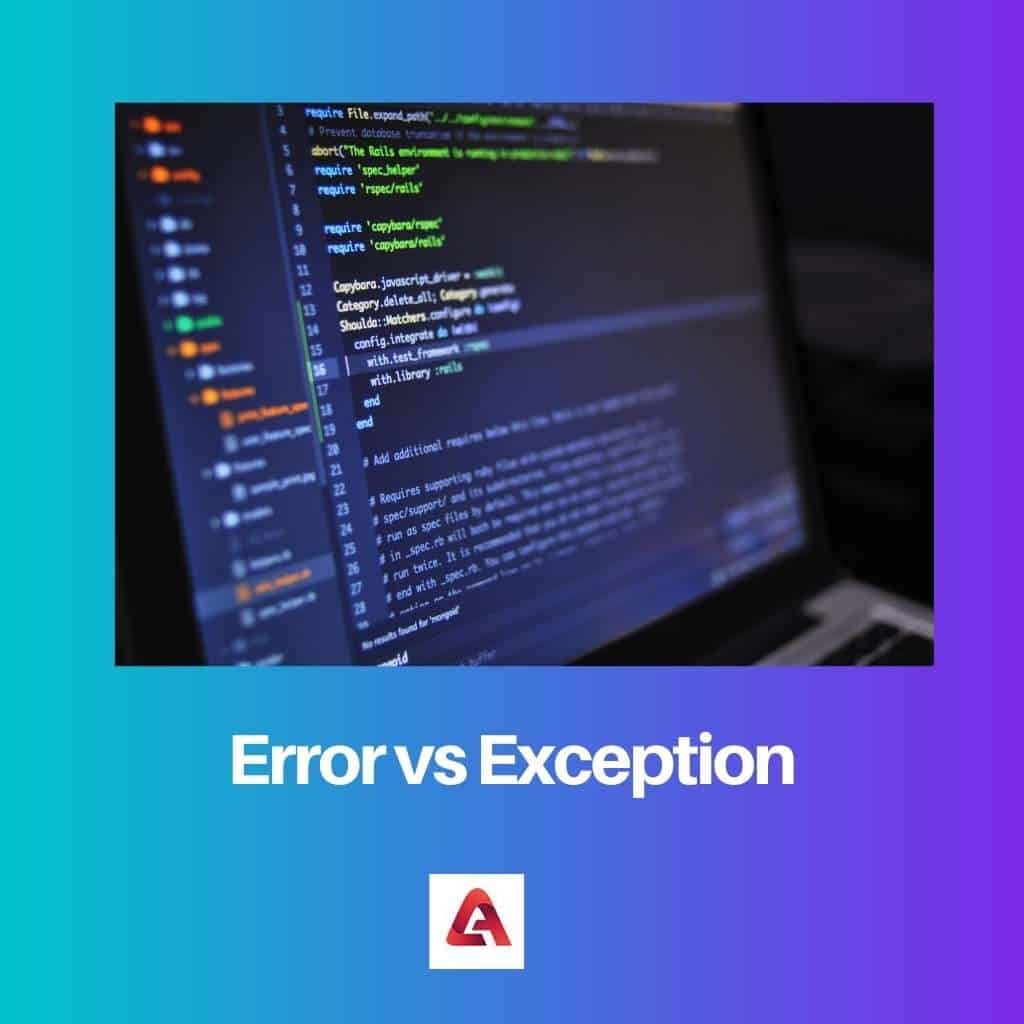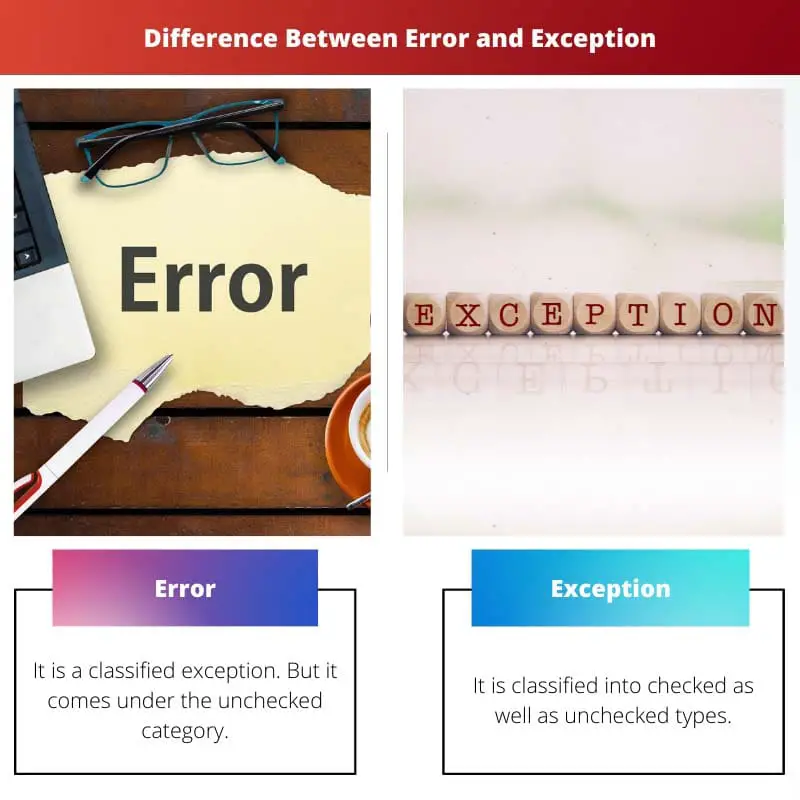Exceptions and errors are both Throwable subclasses. They are not, however, the same thing.
They have very different causes and consequences. People may confuse these two terms and use them interchangeably.
However, in computer terms, they stand for different situations. Also, they require different handling.
As a result, one must recognize and realize the points of distinction between them.
Key Takeaways
- An error is a deviation from an expected result or behavior, while an exception is an event that occurs during program execution that disrupts the normal flow of the program.
- The programmer can detect and handle errors, while the program handles exceptions.
- Errors are caused by syntax or logic errors in the code, while unforeseen circumstances or input errors cause exceptions.
Error vs Exception
An error is an issue that occurs when code is executed, preventing the program from functioning as intended and can be caused by syntax mistakes, logic flaws, or external factors. An exception is a type of error that occurs during program execution but can be handled by the program itself.

Any issue that becomes the cause of computer malfunctioning arising unexpectedly may be termed as an error. Computers can have both software and hardware faults.
There are several different sorts of errors, each with countless variations. To resolve a computer issue, you must first figure out what kind of fault it is and where it came from.
An error is a signal that is displayed to the user.
In programming, an exception is an unforeseen occurrence that occurs during the execution of a program and disturbs the execution of its commands, such as erroneous input or a loss of connectivity.
The word “exception” is a shorthand for “extraordinary incident. Although there are others, an error is a form of unchecked exception.
An exception that occurs both during runtime and compiles time. The most prevalent sorts of computer faults are software errors, which are frequently addressed with software updates or patches.
Unchecked exceptions are unplanned events. The computer does not evaluate these unplanned events during compilation.
Comparison Table
| Parameters of Comparison | Error | Exception |
|---|---|---|
| Type | It is a classified exception. But it comes under the unchecked category. | It is classified into checked as well as unchecked types. |
| Package | Java.lang.error is the package that contains the error class. | Java.lang.exception is the package that contains the exception class. |
| Recovery | It can not be recovered so it is irrecoverable. This is a con of the occurrence of errors. | It can be recovered and handled. Hence, it is recoverable. Thus these situations can be rectified. |
| Occurrence | It can not occur during the time of compilation, unlike an exception. | It occurs both during run time and compiles time, unlike errors. |
| Examples | Some instances of this are OutOfMemoryError, IOError. | Some instances of this are NullPointerException, SqlException. |
What is Error?
An error can be defined as any problem that occurs unexpectedly and causes a computer to malfunction. There are several different sorts of errors.
Each of these errors themselves comes with hundreds of variations.
The most prevalent sorts of computer faults are software errors, which are frequently addressed with software updates or patches.
For instance, a document name, the sort of issue, and the memory address may be given in a blue screen error message in Windows. This data is entered into a search engine to look for a solution to the problem. If you don’t see an error message, look for the symptom you’re having. If your computer suddenly shuts down without notice, it’s most likely a hardware issue rather than a software one.
Any issue with hardware inside the system or connected to the computer is referred to as a hardware fault. Although firmware upgrades can help with some hardware issues, the majority of these errors are handled by replacing the faulty hardware.
It is primarily classified as an unchecked exception. Java.lang.error is the package that contains the error class. One can not recover it. So it is irrecoverable. This reason is a con of the occurrence of errors.
What is Exception?
In computers, an exception is an unforeseen occurrence that occurs during the execution of a program and disturbs the flow of its instructions, such as erroneous input or a loss of connectivity.
Exceptions are a class in Java called java.lang.
The two fundamental subclasses of Exception are IOException and RuntimeException. When the computer compiles a program, verified exceptions occur; for the most part, the program should be capable of recouping from them.
These include exceptions such as FileNotFoundException and InvalidInputException. To tackle this problem, exception handling code can be built, allowing the program to continue.
Unchecked exceptions are unplanned events that the computer does not evaluate during compilation; they occur during program execution. They are normally unhandled.
A terminal exception is an unchecked exception that cannot be resolved by the application and requires the operating system to close the program and perhaps shut down the entire system.
Even though there are others, an error is a form of unchecked exception.
One can not recover an error. Hence, it is irrecoverable.
This reason is a con of the occurrence of errors. Thus, these situations can be rectified.
It occurs both during runtime and compile time, unlike errors. Some instances of this are NullPointerException and SqlException.

Main Differences Between Error and Exception
- Error is classified as an unchecked exception, while an Exception is classified into checked as well as unchecked types.
- Java.lang.error is the package that contains the error class, whereas java.lang. An exception is the package that contains the exception class.
- An error can not be recovered, so it is irrecoverable. This is a con of the occurrence of errors. On the other hand, Exceptions can be recovered and handled. Hence, it is recoverable. Thus these situations can be rectified.
- An error can not occur during the time of the compilation, unlike an exception that occurs both during runtime and compile time.
- Some instances of Errors are OutOfMemoryError and IOError. Some instances of Exceptions are NullPointerException and SqlException.

- https://academic.oup.com/cercor/article-abstract/22/2/260/333894
- https://ieeexplore.ieee.org/abstract/document/6009257/
Last Updated : 11 June, 2023

Sandeep Bhandari holds a Bachelor of Engineering in Computers from Thapar University (2006). He has 20 years of experience in the technology field. He has a keen interest in various technical fields, including database systems, computer networks, and programming. You can read more about him on his bio page.

The post presents an essential distinction between errors and exceptions. It’s an informative read for those in programming and software development.
I appreciate the detailed comparisons and the clear terminology provided in this article. It helps establish a sound understanding of these topics.
Being able to distinguish between error and exceptions is crucial for programming and debugging.
While this article includes accurate information about errors and exceptions, the delivery and language used could be improved.
The comparison table provides a concise view of the differences between errors and exceptions. It’s a helpful resource for students and professionals in the field.
This post provides a comprehensive explanation of the concepts of errors and exceptions. The example comparisons clarify the differences effectively.